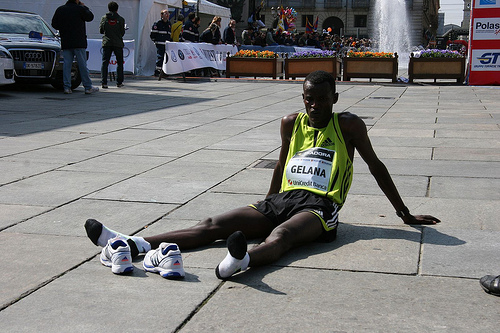
Image credit: Sport Communities on Flickr
Last year a new client came to me with a problem. She should have been in incredible shape -- she was running 50+ miles a week, doing yoga daily and training for her first triathlon. Despite her best efforts, however, she found her performance had plateaued or even decreased. Digging deeper, I asked about her mood and sleeping habits. "The smallest things annoy me," she said. Her sleep, diet and performance at work were all out of whack too. Her problem: overtraining.
I've made a career out of working out and I spend a lot of time motivating my clients to love it as much as I do. Fortunately for me, your body and brain want to help me out. When we exercise we release endorphins -- the chemicals that make us feel good -- into our brains. Endorphins have both pleasurable and addictive effects, and many regular exercisers feel compelled to work out more and more and even feel guilty if they miss a day's training. Dialing your training back can be difficult and overtraining can easily creep up on you.
Put simply, overtraining is a breakdown in performance that occurs when the body is pushed beyond its capacity to recover. If you don't allow your body adequate time to recover, then you run the risk of undoing all your hard work at the gym or on the track. To be clear, overtraining is not a problem of too much training, but of too little rest and recuperation. Gains in your strength and fitness don't happen just because you had an incredible workout, they happen because you rested, ate and recovered afterward.
Reduced performance in the gym isn't the only symptom of overtraining, in fact, there are too many to list in this article, but I can highlight the main ones: fatigue, decreased athletic performance, weakened immune response, sleep disturbances, irritability, reduced libido, changes in appetite. Starting to sound like fun? No, I didn't think so.
If some of these sound familiar to you and you think you may be overtraining, all is not lost. Below are some simple things you can do to get back on (or perhaps off) track.
- Get more sleep, ideally eight hours a night, and especially after a heavy training session.
Make sure your diet is on point, that you're consuming enough calories and that you take the time to prepare healthy post-workout meals. Take breaks from training, you'll be stronger and more energized when you come back to it. When you do come back, change things up. Play with different training regimes but don't just do everything the same or you're more than likely to end up back where you started.Try and apply the same commitment to recovery that you apply to your workouts. Give your body the time it needs to rebound and repair and you'll find yourself with more energy, enhanced performance and a better disposition. Less is sometimes more.
For more by Jamie Galloway, click here.
For more on fitness and exercise, click here.
Support HuffPost
Our 2024 Coverage Needs You
Your Loyalty Means The World To Us
At HuffPost, we believe that everyone needs high-quality journalism, but we understand that not everyone can afford to pay for expensive news subscriptions. That is why we are committed to providing deeply reported, carefully fact-checked news that is freely accessible to everyone.
Whether you come to HuffPost for updates on the 2024 presidential race, hard-hitting investigations into critical issues facing our country today, or trending stories that make you laugh, we appreciate you. The truth is, news costs money to produce, and we are proud that we have never put our stories behind an expensive paywall.
Would you join us to help keep our stories free for all? Your contribution of as little as $2 will go a long way.
Can't afford to donate? Support HuffPost by creating a free account and log in while you read.
As Americans head to the polls in 2024, the very future of our country is at stake. At HuffPost, we believe that a free press is critical to creating well-informed voters. That's why our journalism is free for everyone, even though other newsrooms retreat behind expensive paywalls.
Our journalists will continue to cover the twists and turns during this historic presidential election. With your help, we'll bring you hard-hitting investigations, well-researched analysis and timely takes you can't find elsewhere. Reporting in this current political climate is a responsibility we do not take lightly, and we thank you for your support.
Contribute as little as $2 to keep our news free for all.
Can't afford to donate? Support HuffPost by creating a free account and log in while you read.
Dear HuffPost Reader
Thank you for your past contribution to HuffPost. We are sincerely grateful for readers like you who help us ensure that we can keep our journalism free for everyone.
The stakes are high this year, and our 2024 coverage could use continued support. Would you consider becoming a regular HuffPost contributor?
Dear HuffPost Reader
Thank you for your past contribution to HuffPost. We are sincerely grateful for readers like you who help us ensure that we can keep our journalism free for everyone.
The stakes are high this year, and our 2024 coverage could use continued support. If circumstances have changed since you last contributed, we hope you’ll consider contributing to HuffPost once more.
Already contributed? Log in to hide these messages.

